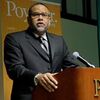It’s Friday, so that means it's panel time.
US President Donald Trump tweeted last weekend that he had canceled scheduled meetings with Afghan President Ashraf Ghani and senior Taliban leaders on September 8. He claimed to have called off the secret Camp David meetings because the Taliban admitted responsibility for a recent attack in Kabul which killed a US soldier. US Special Representative for Afghanistan Reconciliation Zhalmay Khalilzad previously declared that an agreement with the Taliban had been finalized "in principle" and initialed by both sides after nine rounds of painstaking negotiations in Doha, Qatar. "Taliban leaders said they would come to Washington as long as the visit came after the deal was announced. That would become a fundamental dividing point contributing to the collapse of the talks. Mr. Trump did not want the Camp David meeting to be a celebration of the deal; after staying out of the details of what has been a delicate effort in a complicated region, Mr. Trump wanted to be the dealmaker who would put the final parts together himself, or at least be perceived to be," The New York Times reported September 8.
"In the largest of a number of demonstrations across Britain on Saturday, crowds gathered outside Downing Street to protest against 'Boris Johnson’s coup against the democratic process' and hear combative speeches from anti-Brexit campaigners. The London protest was marred by violence when scores of pro-Brexit counter-protesters attempted to disrupt the rally and provoke the anti-Brexit demonstrators by marching through the crowd holding a banner demanding the UK revert to WTO rules – which some believe would be the default eventuality after a no-deal Brexit – and verbally insulting them," The Guardian reported on September 7. All of this occurred after Work and Pensions Secretary Amber Rudd launched a broadside against UK Prime Minister Boris Johnson's "aggressive and dangerous" approach to Brexit when she resigned on September 7 from the Conservative Party. Rudd, who favors Britain remaining in the EU, warned that if Johnson continues to pit Parliament against the people, violence in the streets will follow.
Former South Carolina governor and congressman Mark Sanford said last Sunday that he's challenging President Trump in 2020 for the Republican presidential nomination, and he criticized both the president and Congress for the nation's rising deficit. "I think we need to have a conversation on what it means to be a Republican," he told Fox News. "I think that as a Republican Party, we have lost our way. ... The epicenter of where I'm coming from is that we have lost our way on debt and deficits and spending … The president has called himself the 'King of Debt,' has a familiarity and comfort level with debt that I think is ultimately leading us in the wrong direction."
President Trump claims US forces are responding aggressively after an American soldier was killed in a car bomb attack in Kabul, Afghanistan, last week. Speaking at the Pentagon's annual 9/11 ceremony, Trump said, "We have hit our enemy harder than they have ever been hit before and that will continue." Trump also talked about canceling planned peace talks with the Taliban after the car bomb attack. He said, "They thought they would use this attack to show strength, but actually, what they showed is an unrelenting weakness." Wednesday marked the 18th anniversary of the 9/11 terror attacks on the United States. But as the Washington Post states, "That was thrown into sharp relief this week when President Trump abruptly announced Saturday that he was canceling months of negotiations with the Taliban, even as he aims to fulfill a promise of ending America’s endless wars. The US war in Afghanistan has led to the deaths of about 2,400 American service members, including 16 in combat action this year. Some 20,000 more have been wounded, many grievously." So will we ever pull out, and why are we still there?
The US Supreme Court ruled Wednesday that the Trump administration can enforce its new asylum rules, which require some people seeking asylum to apply in a third country before applying in the US. The administration's intent is to block immigrants from Central and South America from traveling to the southern border of the US to ask for asylum. The high court said the administration could enforce the new rule while it's being challenged in court, overturning a lower court's ruling that temporarily blocked the measure.
We have all these stories and more!
GUESTS:
Kathy Kelly — Co-coordinator of Voices for Creative Nonviolence.
Caleb Maupin — Journalist and political analyst who focuses his coverage on US foreign policy and the global system of monopoly capitalism and imperialism.
Dr. Jack Rasmus — Professor of economics at Saint Mary's College of California and author of "Central Bankers at the End of Their Ropes: Monetary Policy and the Coming Depression."
David Schultz — Professor of political science at Hamline University and author of "Presidential Swing States: Why Only Ten Matter."
We'd love to get your feedback at radio@sputniknews.com




